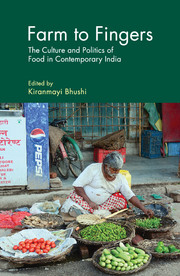Book contents
- Frontmatter
- Dedication
- Contents
- List of Figures and Tables
- Preface
- 1 Introduction
- 2 The Making of ‘Edible Animal Source Foods’ and its Contemporary Reality in Delhi
- 3 Appropriating the Cow: Beef and Identity Politics in Contemporary India
- 4 Eating Akhuni in India
- 5 Health, Standardization and ‘Bengali’ Sweets
- 6 Treating Children, Feeding Junk Food: An Inquiry into a Middle Class Project
- 7 Diaspora Dish: Cooking, Writing, and Creating Identities in Food-blogs
- 8 Measuring Hunger: Debates on an ‘Adequate’ Diet in Colonial North India
- 9 Managing Food: India's Experience with the Public Distribution System
- 10 Food Sovereignty: The Future of Food
- Contributors
- Index
5 - Health, Standardization and ‘Bengali’ Sweets
Published online by Cambridge University Press: 05 July 2018
- Frontmatter
- Dedication
- Contents
- List of Figures and Tables
- Preface
- 1 Introduction
- 2 The Making of ‘Edible Animal Source Foods’ and its Contemporary Reality in Delhi
- 3 Appropriating the Cow: Beef and Identity Politics in Contemporary India
- 4 Eating Akhuni in India
- 5 Health, Standardization and ‘Bengali’ Sweets
- 6 Treating Children, Feeding Junk Food: An Inquiry into a Middle Class Project
- 7 Diaspora Dish: Cooking, Writing, and Creating Identities in Food-blogs
- 8 Measuring Hunger: Debates on an ‘Adequate’ Diet in Colonial North India
- 9 Managing Food: India's Experience with the Public Distribution System
- 10 Food Sovereignty: The Future of Food
- Contributors
- Index
Summary
Background and context
Misti khele Diabetes hoyna (Eating sweets does not induce diabetes) Diabetes rogir misti khaoa kshatikar (Sweets are dangerous for diabetic patients)
Loksanskriti Gabeshana (a research journal on folk culture) carries this interesting advertisement by Santosh Mistanna Bhandar, a sweetshop in College Street, North Kolkata, known for its doi (dahi/curd) in one of its special issues on Bengali sweets. Through this advertisement, the sweetshop tries to challenge the associated risk of diabetes, which is perceived as a particularly Indian disease, posing a challenge that most sweetshops across West Bengal face as food products with increasing sugar levels are prohibited in diets of diabetic patients.
The shift to ‘low-calorie’ products needs to be read against the backdrop of the global discussions on the health risks due to the increasing consumption of fast food products. Ty Matejowsky (2009) draws upon research (Gill 2006; Popkin et al 2002; Rosenthal 20081; Schlosser 2001; Ulizaszek 2007)2 on the fast food industry and its associated ‘medical conditions like obesity, cardiovascular diseases and type 2 diabetes, which are due to “diets rich in calories, saturated fat, salt and sugar”’ (Matjewosky 2009). The impact of global health discourses on local food industry, including sweet industry, reveals a changing relation between health, food safety, and standardization practices.
The sweet industry across West Bengal has not remained immune to these global health discourses. The advertisement I cited in the beginning of the essay clearly shows the censorship that the sweet industry faces in the diet of diabetic patients. Mostly unorganized in nature, the sweet industry adapted itself to the changing health needs and has introduced a range of low-calorie products, including ‘diabetic sandesh’ targeted towards people suffering from diabetes. Instead of posing the question how these low-calorie sweets are produced, it is important to ask how do the discourses of health inform the regulatory mechanisms that governs this industry.
- Type
- Chapter
- Information
- Farm to FingersThe Culture and Politics of Food in Contemporary India, pp. 103 - 127Publisher: Cambridge University PressPrint publication year: 2017

